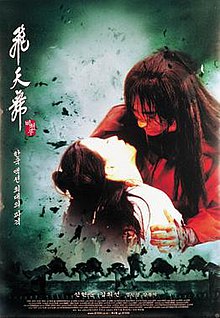fiction.wikisort.org - Movie
Bichunmoo (Korean: 비천무; RR: Bicheonmu) is a 2000 South Korean martial arts fantasy drama film written and directed by Kim Young-jun and featuring Shin Hyun-joon, Kim Hee-sun, and Jung Jin-young. At the time of its release, it was the most expensive film in Korean history (it was supplanted in 2001 by Musa).
| Bichunmoo | |
|---|---|
 | |
| Hangul | 비천무 |
| Hanja | 飛天舞 |
| Revised Romanization | Bicheonmu |
| McCune–Reischauer | Pich'ŏnmu |
| Directed by | Kim Young-jun |
| Written by | Jeong Yong-ki Kim Young-jun[1] |
| Based on | Bichunmoo by Kim Hye-rin[2] |
| Produced by | Lee Tae-won Yoo Jung-ho[1] |
| Starring | Shin Hyun-joon Kim Hee-sun Jung Jin-young |
| Cinematography | Byun Hee-sung Kim Tae-hwan[1] |
| Edited by | Lee Hyun-mee[1] |
| Music by | Kim Seong-jun[1] |
Production company | Taewon Entertainment[1] |
| Distributed by | Cinema Service[1] |
Release date |
|
Running time | 126 minutes[1] |
| Country | South Korea |
| Language | Korean |
| Budget | US $4,000,000 |
Plot
In 12th-century China, during Mongol rule, childhood sweethearts Jinha and Sullie are separated but vow to reunite. Orphan Jinha begins training in the Bichun martial arts and discovers his father was a swordsman murdered by the Mongol army. Meanwhile, Sullie's father, a Mongol general, arranges for her to marry a Mongol noble. Believing Jinha to be dead, Sullie marries the noble. Recovering from near-death, Jinha takes on the persona of bandit Jahalang, and begins an anti-Mongol crusade with the help of his army of warriors. Finally Jin-ha and Sullie are re-united, when Jinha's bandit warriors infiltrate Sullie's family manor.
Cast
- Shin Hyun-joon as Yu Jinha
- Kim Hee-sun as Sullie
- Jung Jin-young as Namgung Junkwang
- Jang Dong-Jik as Lai
- Choi Yoo-jung as Yeojin
- Gi Ju-bong as Kwakjung
- Bang Hyep as Namgung Sung
- Kim Hak-cheol as Taruga
- Kim Soo-ro as Ashin
- Lee Han-gal as Changryun
- Seo Tae-hwa as Saijune
Production
Bichunmoo was shot entirely in China, with a Hong Kong-based martial arts director.[3]
Criticism
This section does not cite any sources. (March 2007) |
In spite of its financial success, the film was heavily criticized on its initial release in Korea, primarily due to its alleged disloyalty to the comic book on which it was based. Another argument given against the film was the casting choice of Kim Hee-sun, who was perceived as being too modern for a period swordplay film.
Reception
Alan Morrison of Empire called Bichunmoo a "Top-notch martial arts action".[4]
References
- "Bichunmoo (Bicheonmu)". Korean Movie Database (KMDb). Retrieved 2021-08-11.
- "Bichunmoo Review". The Digital Fix. Retrieved 2021-08-11.
- Elley, Derek (2000-11-26). "Bichunmoo". Variety.
- "Bichunmoo: Warrior of Virtue Review". Empire. 31 December 1999.
External links
- Bichunmoo at IMDb
Другой контент может иметь иную лицензию. Перед использованием материалов сайта WikiSort.org внимательно изучите правила лицензирования конкретных элементов наполнения сайта.
WikiSort.org - проект по пересортировке и дополнению контента Википедии